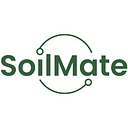SoilMate’s Weekly News Digest #21
Hope you’ll enjoy our digest of the most trending AgTech news of the week!
Bayer launched a decarbonization program in the EU
Bayer launched the European Carbon Programme this week to recognize the crucial role that farmers and landowners can play in contributing to reducing greenhouse gas emissions by 30% by 2030. The main goal of a more sustainable and sustainable food system is the decarbonization of the supply chain. In addition, defining how farmers reducing greenhouse gas emissions will be rewarded is a vital part of the Green Deal project under the Green Growth Initiative of the European Commission.
«The main idea is to reward growers for adopting climate-smart farming practices like using cover crops, tillage reduction, crop rotations, and precision nitrogen application. These activities sequester carbon in the soil while improving soil health, resilience, and productivity as well as limit emissions,» said Lionnel Alexandre, Carbon Business Venture Lead for Europe, Middle East, and Africa at Bayer Crop Science.
Sugar beet spot spraying with FarmDroid field robot
The issue of sufficient protection of sugar beet from weeds and pests during cultivation without spreading pesticides over the whole area is addressed in the pilot project Südzucker AG, the agricultural technology company Amazone and the Danish FarmDroid Field Robot Manufacturer. The goal is to reduce herbicides and insecticides usage to a minimum by utilizing a highly automated planting robot with solar power and a specific method of spot spraying. Amazone uses FarmDroids’ unique knowledge of plant conditions and has developed an innovative, precise field-spraying system that makes it possible to apply the herbicide exactly on or near the beet, with minimal use of plant protection.
Nanotechnology and AI can be the key to solving the global food security issue
Climate change, population growth, the competing demand for land for biofuel production, and the deterioration of soil quality mean that it is becoming increasingly difficult to feed the world’s population.
A new study from the University of Birmingham shows that «precision farming,» in which farmers respond in real-time to changes in crop growth through nanotechnology and artificial intelligence, can offer a practical solution to problems threatening global food security. The main driver of agricultural innovation is the need to feed the world’s growing population by reducing the amount of agricultural land while preserving the health of the soil and protecting the quality of the environment.
Measure greenhouse gases in the air with a laser frequency-comb instrument
Researchers from the National Institute of Standards and Technology (NIST) upgraded their laser frequency-comb instrument to measure three greenhouse gases in the air — nitrous oxide, carbon dioxide and water vapor, and such air pollutants as ozone and carbon monoxide. Combined with an earlier version of the methane measurement system, NIST’s technology can now identify all four central greenhouse gases that will help in understanding and monitoring the emissions of these gases involved in climate change.
